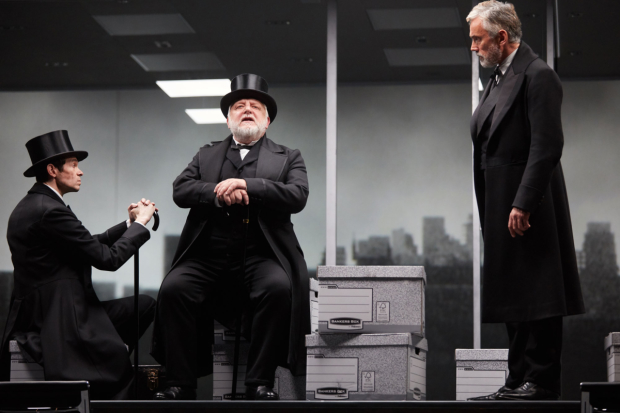Why are we so obsessed with the history play?
As ”The Lehman Trilogy” opens at the National, Matt Trueman looks at why we’ve been seeing such a glut of history plays at the moment

© Mark Douet
History, as one of Alan Bennett's History Boys so elegantly puts it, is "just one f***ing thing after another." It's a neat line – a deadpan statement of the damn obvious – but it's also a lot subtler than it lets on.
Rudge, inadvertently, is misquoting a phrase often attributed to the historian Arnold J Toynbee: that history is 'one damn thing after another'. Only his words had themselves twisted out of shape: he actually started with 'life' not 'history'. And Toynbee was guilty of misquoting too: the socialist author Max Plowman – "Life is just one damned fact after another".
Here's the kicker: neither man believed it. Both pinned the thought down in order to rebut it – to argue against the idea that life is reducible and history is random. Yet their soundbites have outlived their objections. History, as the saying goes, is doomed to repeat itself. Only it's never the same thing twice. If it doubles up, it also distorts.
We are living in a moment of history plays
We are living in a moment of history plays – again. I don't mean period dramas, nor plays about some past event. Instead, all sorts of playwrights are presenting history's sweep: one f***ing thing after another.
The Lehman Trilogy is the latest to roll through the years. Stefano Massini's sprawling play spans 164 years, unfurling the history of Lehman Brothers from its beginnings as a small dry-good store to its collapse in the crash of 2008: a global giant gone to ground. In the process, it offers a history of a country as well as a corporation, and of capitalism itself.
It's very much not alone. Ella Hickson's Oil flowed from a candlelit Cornwall in 1889 through imperialism, Iraq and off into an oil-free future – two years shy of The Lehman Trilogy's sweep. The RSC's Imperium races through 15 turbulent years of Roman history, tracking a declining democracy's descent into autocracy. St George and the Dragon, Rory Mullarkey's triptych take on a Soviet satire, ran us from a green and pleasant England of yore, through the industrial revolution, all the way to our own era of rampant inequality.
There's more: James Graham wound and rewound 30 years of party political history in Labour of Love. Rajiv Joseph's Describe the Night followed a thread of Russian propaganda all the way to President Putin and state-sponsored disinformation. Taylor Mac's 24-hour song cycle hopped, decade by decade, through American history, post-independence to the present day.
All of these plays are driving at the same question: How the hell did we end up here?
This is more than a craving for big stories and box-set theatre. All of these plays, in their different ways, are driving at the same question: How the hell did we end up here? They all contain an admission that we find ourselves in crisis – be that political or economic, national or environmental – and crises that have crept up on us at that, byproducts of long-term behavioural patterns. By tracing back, sifting the seeds that grew into systems, these plays hope to better understand where we are.
In turbulent times, we look for history lessons. It is, I think, one of the reasons the Almeida has had such success under Rupert Goold. Most of the shows that programmed there have, one way or another, examined the way history happens and hardens. It hung in the balance in Robert Icke's Mary Stuart and was dug up from the past in Goold's own Richard III. Both King Charles III and Mr Burns raced off into the future, while Little Revolution and Ink asked how history gets told and by whom. Other shows have offered something longer-term, zoomed-out: Icke's Hamlet, Our Town, Summer and Smoke. Time is of the essence.
If these history plays are satisfying, it's often because of their scope. They take a step back and look at the whole, following a thread from a distant beginning to an inevitable end. Yet doing so tends towards simplification, and most of these plays follow a stubborn linearity – an unshakeable faith in cause and effect. You see it in every history cycle: the errors of one generation bring about those of the next. The pendulum swings. Each era knocks into another.
Only history doesn't happen like that – not really. Time isn't linear, and it makes little logical sense. History plays tend to insist otherwise. They're one f***ing thing after another.


















